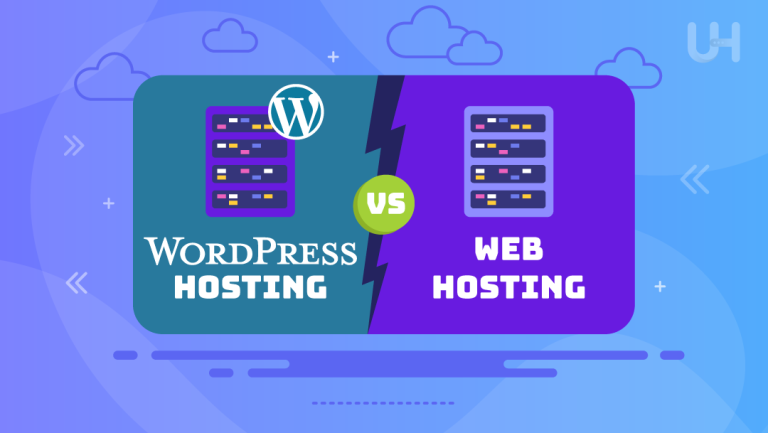Websites are such an integral part of today’s life, so one has to know what lies beneath. Two major concepts that are likely to confuse people are web host vs web server. As much as they are very interconnected, they each play a different part in how a website functions. Their differences have to be noted for anyone thinking of starting or managing a website.
The following blog explains the important differences between a web host and a web server, thus elaborating on the issues of choosing between them for your website. By the end, you will be able to see how it all interlinks.
What Is A Web Server?
A web server is a device that can exist either physically in the real world or virtually and uses which web content is stored, processed, and delivered to users. The user request travels to the web server, which processes the request and forwards the user to the indicated web pages. Web servers are basically the skeleton of the Internet; in simpler words, they enable the interchange of information between users and websites. They run on specific software, like Apache, Nginx, or Microsoft IIS software. They deal with HTTP cookie requests and keep pages moving to users’ devices smoothly.
Key Features
- Request Handling: It handles and processes the approaching HTTP request by the user through their browser.
- Content Delivery: It caters to static and dynamic Web pages; it can also deliver static content, including HTML pages, images, and scripts.
- Security: This involves security protocols such as SSL/TLS for encryption purposes to counter various cyber threats.
- Load Balancing: This involves distributing armies of incoming traffic across multiple servers to boost website performance and reliability.
- Caching: The method includes temporary storage for frequently used data to facilitate web page delivery at a faster rate.
- Logging: It allows the logging of all activities performed by the server, ranging from requests and errors to records of the user’s interactions, thereby effectively allowing them to be monitored.
- Configuration: Allows customization of server settings to optimize performance, security, and resource allocation.
What Is A Web Host?
A web host is a form of service provider that allows individuals or businesses to have their website viewed by potential readers over the internet. Literally, web hosting companies provide space on their servers where your website files, images, and other data are present. So, if someone typed your website’s URL into their browser, the web host shall make sure that it pops out there and is ready to load. Web hosting will be at the core of any presence on the Internet, giving needed infrastructure so your website remains up and running.
Key Features
- Server Space: This service provides you with space on their server to keep all your website files, databases, and emails.
- Bandwidth: The amount of data transferred between your website and its users.
- Uptime Guarantee: This guarantees that your website will be up most of the time, with reduced downtime.
- Security: Includes SSL certificates, firewalls, and back-ups to ensure and keep your website secure.
- Support: Technical support, mostly available on a 24\×7 basis, for assistance in case of any hitch with their hosting.
- Control Panel: The place from where you can manage your website, email accounts, and so many other options in a very user-friendly manner, quite like cPanel.
- Scalability: You can change your hosting plan as your website grows up and gets more resources whenever required.
Get A Hosting Service That Is Reliable & Secure!
Need a seamless web hosting experience? Choose UltaHost service. Their website hosting plans provide reliable infrastructure, robust security, and 24/7 support, ensuring your site stays online and performs at its best—perfect for anyone needing dependable hosting solutions.
Web Host vs Web Server: Major Differences

While the terms web host vs web server are often used interchangeably, they represent two stages of web hosting providers. A web host comprises the supply of the infrastructure that allows the website to be accessible on the internet, while a web server is a real machine storing and serving your website’s data.
Purpose
- Web Host: The main purpose of a web host is to offer the hardware and software infrastructure that is mandatory in making a website accessible online. They provide server space, domain registration, email hosting, and technical support. The principal role of web hosting services is ensuring 24-hour website delivery to users and minimal downtime. Web hosts range from individual bloggers/machines to big corporations, and each has its kind of clients, with several packages provided to accommodate such clientele.
- Web Server: A web server is there to serve more of a technical function. It processes the HTTP requests sent from users’ browsers and serves the requested web pages back. A web server keeps all files that constitute a website. It will include HTML, CSS, JavaScript, and all kinds of multimedia. It helps in processing incoming requests for required files serving it back to a user’s browser, thanks to which a website appears on end-user devices sufficiently and works properly.
Functionality
- Web Host: Web hosts don’t just host your website; they provide a host of services and maintenance in various cases for hardware, software, or network machinery that keep your site in top form. It includes ensuring adequate bandwidth, uptime and allowances for security, such as firewalls and different types of SSL certificates. They provide customer support, automation in creating backups, and the ability to scale your hosting plan as your website grows.
- Web Server: A web server purposely delivers web pages to a user. In this line, a web server will receive forwarded requests by users upon typing URLs and then process them before eventually returning the content requested at the user’s end. Besides, web servers may host static and dynamic content—static contents being HTML files and others being pumped up with processing scripts like PHP or querying from a database. It additionally manages server-side functions like caching, load balancing, and putting in place security protocols such as HTTPS.
Components
- Web Host: The web host includes dozens of web servers, numerous databases, and all necessary network infrastructure. Control panels, such as cPanel or Plesk, are other components that come with web hosting services. The buyer uses them to manipulate the web hosting account features, add websites, manage email accounts, etc. The web host also offers DNS management, that is when users will type in your domain name, they are correctly sent to the server your site is actually located on.
- Web Server: A web server is part of hardware and might be considered a virtual machine hosting server software. The main hardware elements of the web server include an operating system, software used (e.g., Apache or Nginx), various configuration files, and some storage hardware to serve website files. The web server itself handles server-side scripting, databases, and sometimes security measures to run smoothly.
Scope
- Web Host: The duties which the web host assumes are wide; from offering server space and bandwidth, among other auxiliary services (e.g., registration of a domain and email hosting), to such services as technical support. In essence, web hosts serve so many needs and varieties of hosting plans his or her offer. Typical hosting is shared hosting, virtual private server hosting, and dedicated hosting. The onus is on them—the web hosting service organization—to keep your website up and running well.
- Web Server: A web server is somewhat limited and specialized in scope. It is basically concerned with accepting requests and serving web pages. A web server is one of the key components of web hosting. It is part of a web host’s infrastructure. This mainly entails receiving and acting on HTTP requests, serving content, maintaining server resources, and ensuring that it is secure.
Management
- Web Host: With web hosting or shared web hosting, the web host service provider takes care of most aspects of server maintenance—including hardware upgrades, software installation, and security fixes—and even extends a support system that helps the user with troubleshooting and administration of hosting issues. This hands-on management approach makes web hosting services ideal for users who want a reliable online presence without the need to manage server details.
- Web Server: Web servers require more direct management, particularly in environments where the user has full control, such as with dedicated or VPS hosting. This ranges from server settings configuration to performance optimization, security protocols, server-side software, and even handling updates. In some cases, the user may get manage hosting plans whereby the web host does this part for them. Others prefer to carry out the servicing by themselves to have a greater degree of solemnity.
Conclusion
Knowing the difference between web server and web hosting will help keep you better informed about the decisions you need to make for your website’s infrastructure. A web host is that provider, just like the name suggests, offering a platform and editing resources that keep one’s website online. The web server serves simply as an engine of processing, Processing all requests and returning content to the user. Both web server vs web hosts work together to realize an accessible, secure, and highly performing website. You can set up a strong online presence for the particular needs of your business by choosing the right combination of server and host services and management.
For top-tier performance and control, consider a dedicated server from UltaHost. It gives you full control over your web server, ensuring optimal speed, security, and customization.
FAQ
What are the major differences between a web host and a web server?
A hosting company offers structures and services that enable a website to be accessible, while a web server is any particular machine that contains prerecorded information to replay or serve.
Do I need a web host and a web server to host my website?
Yes, you need both. The web host provides the space and resources, and the web server delivers this content to users on your website.
Can I host my own website on my server?
Yes, you can, but only with the technical knowledge to pursue hardware, software, and security management.
What types of hosting services do web hosts offer?
Web hosts offer different hosting plans that range from shared hosting to VPS and dedicated hosting.
Does a web host manage the server?
This is true in most cases. Web hosts manage server maintenance, updating, and security; however, some plans allow users to manage their own servers.
What role does a web server play in website performance?
The web server is paramount in processing requests and dispensing the content as fast as possible, thus your website’s performance falls directly on it.
How does security differ between a web host and a web server?
While a web host provides overall security to your hosting environment, a web server is responsible for running security protocols like SSL/TLS to transfer data safely.













